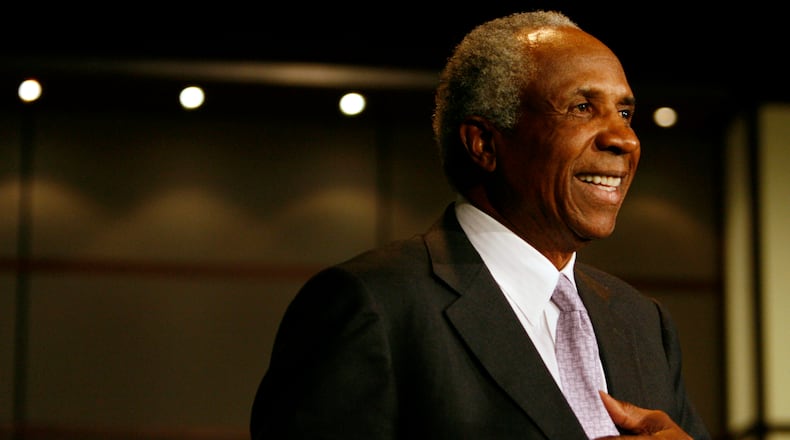DeWitt spoke those words in 1965 when he traded Frank Robinson to the Baltimore Orioles for pitchers Milt Pappas and Jack Baldschun, plus outfielder Dick Simpson.
It goes down as one of the worst trades in Major League history. In 1966, Robinson ravaged American League pitchers — 49 home runs, 122 runs batted in, .316 batting average.
The Cincinnati Reds mourn the loss of Hall of Famer Frank Robinson. pic.twitter.com/YoQLwfAYt6
— Cincinnati Reds (@Reds) February 7, 2019
And it won him the American League Most Valuable Player award, matching the one he won in 1961 with the Reds, the only player in history to win MVP in both leagues. And he won the Triple Crown in 1966.
»RELATED: Reaction to Frank Robinson’s death
The trade was immortalized in the movie Bull Durham when Susan Sarandon’s character, Annie Savoy, said, “Bad trades are a part of baseball and who can forget Frank Robinson for Milt Pappas, for God’s sake.”
An old 30? Robby went on to play 13 more seasons and ended up in baseball’s Hall of Fame, gaining 89 percent of the vote in 1982.
Robinson, 83, died Thursday after battling bone cancer, leaving an unforgettable legacy to all baseball fans as a player, a manager and an executive.
His career with the Reds began in 1956 and he won the Rookie of the Year award, just nine years after another Robinson, Jackie, broke baseball’s color barrier.
While Frank brought smiles to fans coast-to-coast, he was a serious man, not one to smile easily or often.
As former pitcher Jim Kaat said, “He was mean and angry on the field. He played with a chip on his shoulder. He was not afraid to take a shortstop into left field with a hard slide.
»RELATED: Cincinnati Reds Hall of Famers
“He probably felt slighted that during his time everybody talked about Willie Mays, Mickey Mantle and Hank Aaron.”
Robinson believed he belonged in the same sentence — and he probably did.
Statement from Cincinnati Reds CEO Bob Castellini: pic.twitter.com/f0pAUtMXw2
— Cincinnati Reds (@Reds) February 7, 2019
And he was fearless. He crowded home plate, sticking his front elbow across the strike zone. Dodgers pitcher Don Drysdale hit him time and again, but Robby would retaliate with a home run or a double his next time up. He led the league in getting hit by pitches seven times.
“Pitchers did me a favor when they knocked me down,” he once said. “It made me more determined. I wouldn't let that pitcher get me out. They say you can't hit if you're on your back, but I didn't hit on my back. I got up.”
Said Kaat, “He crowded home plate and you’d think you could pitch him inside. But he’d drop that front foot and pull an inside pitch into the seats.”
As he did one day in Baltimore when he became the only man to hit a ball out of Memorial Stadium.
He made history in 1975 when the Cleveland Indians hired him as a player/manager, the first black manager in major league history.
»RELATED: Hall of Fame voting history
On Opening Day, 1975, his first game, on his first at bat, wearing that gosh-awful blood red Indians uniform of the day, Robinson hit a home run off New York Yankees pitcher Doc Medich on a 2-and-2 pitch.
His Indians team wasn’t very good, but Robby stood up for it and umpires who felt his wrath can attest to that as he later managed San Francisco, Baltimore and Montreal/Washington.
One of Robby’s sayings was that, “Baseball is a beautiful game, when it is played right.” And as both a player and a manager he demanded that his teammates and players played the game right. And he always played it right when he was on the field.
When he retired, MLB hired him and, of course, put him in charge of discipline, the man who fined players for their on-the-field indiscretions.
His accomplishments were astonishing. He made 14 All-Star teams, six after DeWitt’s infamous comment.
He was durable, four times finishing in the top 10 in number of games played. He hit 586 home runs, 10th on the all-time list. He was, of course, feared. He was intentionally walked 218 times, 13th on the all-time list.
Credit: Mark Wilson
Credit: Mark Wilson
His number ‘20’ is retired by both the Reds and the Orioles and he won the Presidential Medal of Honor, the highest award a civilian can attain. And he was still serving as a special advisor to commissioner Rob Manfred when he died.
A few years back, Robinson was the speaker for the Heart Institute of Dayton’s annual event at the Marriott and I was the emcee, interviewing Robinson on the stage.
And he quietly said, “I always tried to do my best. I knew I couldn't always be the best, but I tried to be.”
There weren’t many who ever did it better.
About the Author


